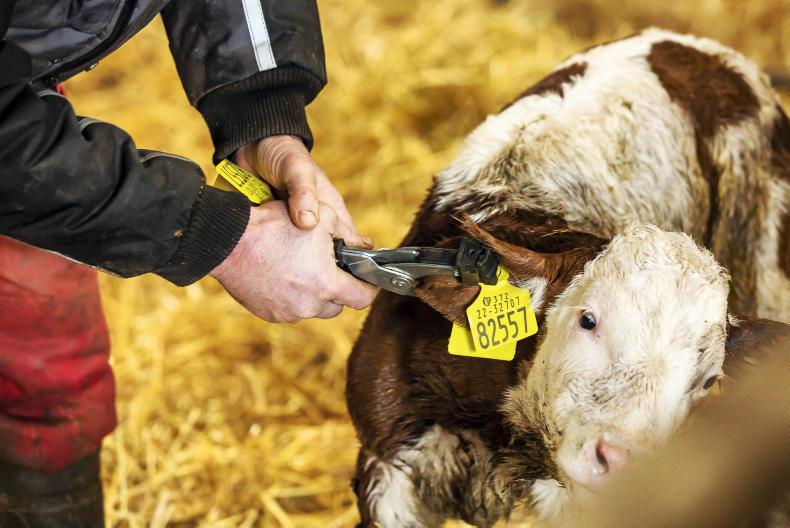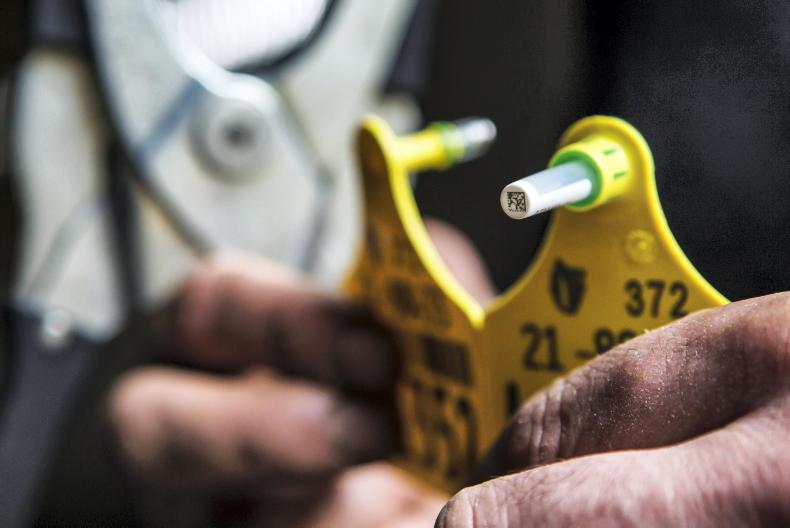The English government is proposing to bring in electronic identification (EID) tagging for all cattle in order to remove red tape for farmers, marts and processors.
The move is also aimed at strengthening the position of UK beef exports in international markets.
Improvements in the cattle registration and traceability system for cattle have been set out by the UK Department for Environment, Food and Rural Affairs (DEFRA) and farmers now have eight weeks to reply via a public consultation.
Proposals
Under the proposals, DEFRA said it is aiming to reduce the administrative burden for farmers, livestock markets and abattoirs where possible.
“When bovine electronic identification is introduced, keepers will be able to scan a beast’s ear tag to access its digital record, make changes and report births, movements and deaths.

The new EID tags will remove red tape, according to DEFRA. / Philip Doyle
“Our aim is for the digital record to be the single source of truth for all data relating to each beast, so that keepers no longer have to maintain a separate on-farm holding register or manually update passports.
“Markets and abattoirs will be able to process electronically identified animals far more quickly without the need to cross-reference or manually update passports,” a spokesperson said.
Registration
Similar to Ireland, by law all bovines in England must be registered with the British Cattle Movement Service to allow the government to identify and locate livestock in the event of an animal disease outbreak or food safety incident.
“By registering their cattle, farmers and keepers play an important role in protecting the national herd from insidious diseases such as bovine TB and bovine spongiform encephalopathy (BSE),” said English biosecurity minister Lord Benyon.

English farmers could soon be facing new tagging rules. \ Philip Doyle
As well as the introduction of bovine electronic identification, other new proposals include a fairer and more proportionate regulatory framework and greater flexibility, such as for late registration of calves, so that farmers do not suffer financially by having them excluded from the food chain.
Cattle will also have a new database that will make tracing individual animals quicker and easier, which will help to reduce the harm caused by a disease outbreak.
The English government is proposing to bring in electronic identification (EID) tagging for all cattle in order to remove red tape for farmers, marts and processors.
The move is also aimed at strengthening the position of UK beef exports in international markets.
Improvements in the cattle registration and traceability system for cattle have been set out by the UK Department for Environment, Food and Rural Affairs (DEFRA) and farmers now have eight weeks to reply via a public consultation.
Proposals
Under the proposals, DEFRA said it is aiming to reduce the administrative burden for farmers, livestock markets and abattoirs where possible.
“When bovine electronic identification is introduced, keepers will be able to scan a beast’s ear tag to access its digital record, make changes and report births, movements and deaths.

The new EID tags will remove red tape, according to DEFRA. / Philip Doyle
“Our aim is for the digital record to be the single source of truth for all data relating to each beast, so that keepers no longer have to maintain a separate on-farm holding register or manually update passports.
“Markets and abattoirs will be able to process electronically identified animals far more quickly without the need to cross-reference or manually update passports,” a spokesperson said.
Registration
Similar to Ireland, by law all bovines in England must be registered with the British Cattle Movement Service to allow the government to identify and locate livestock in the event of an animal disease outbreak or food safety incident.
“By registering their cattle, farmers and keepers play an important role in protecting the national herd from insidious diseases such as bovine TB and bovine spongiform encephalopathy (BSE),” said English biosecurity minister Lord Benyon.

English farmers could soon be facing new tagging rules. \ Philip Doyle
As well as the introduction of bovine electronic identification, other new proposals include a fairer and more proportionate regulatory framework and greater flexibility, such as for late registration of calves, so that farmers do not suffer financially by having them excluded from the food chain.
Cattle will also have a new database that will make tracing individual animals quicker and easier, which will help to reduce the harm caused by a disease outbreak.








 This is a subscriber-only article
This is a subscriber-only article










SHARING OPTIONS: